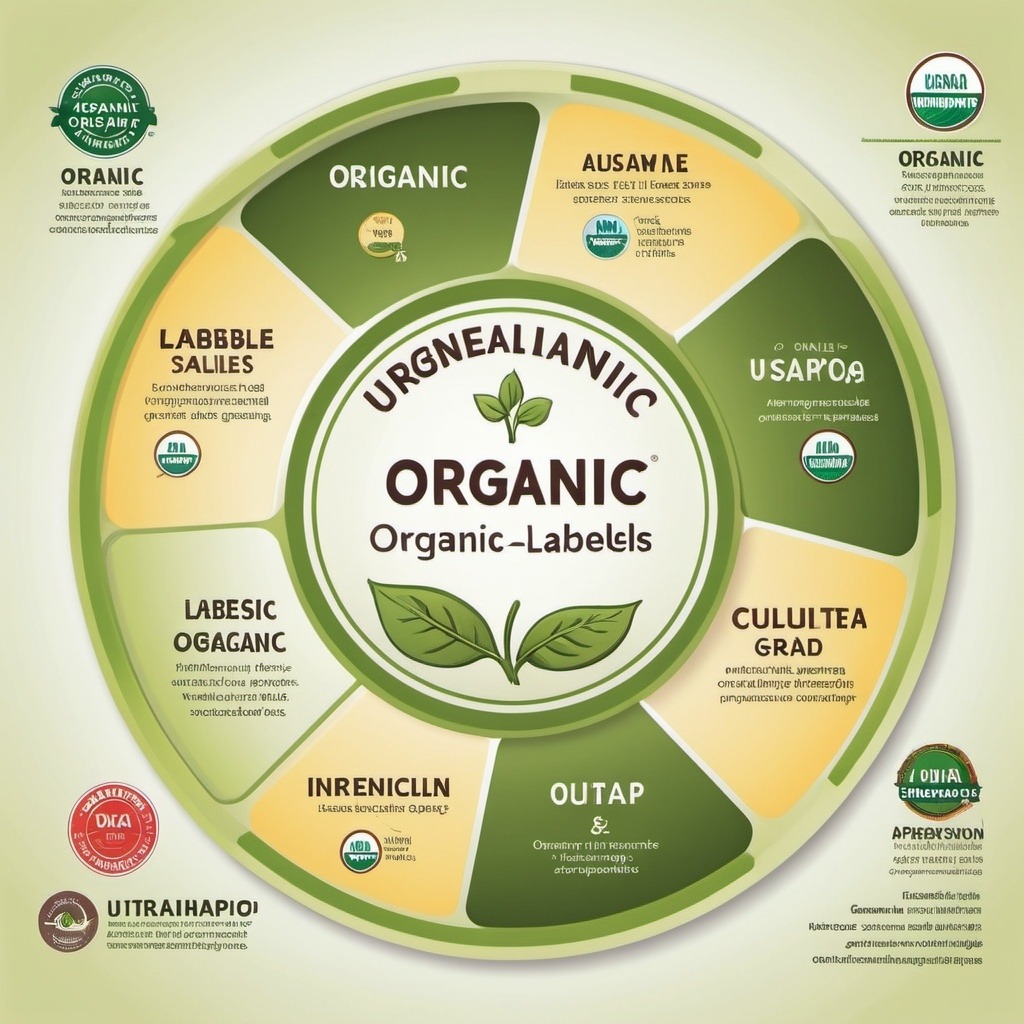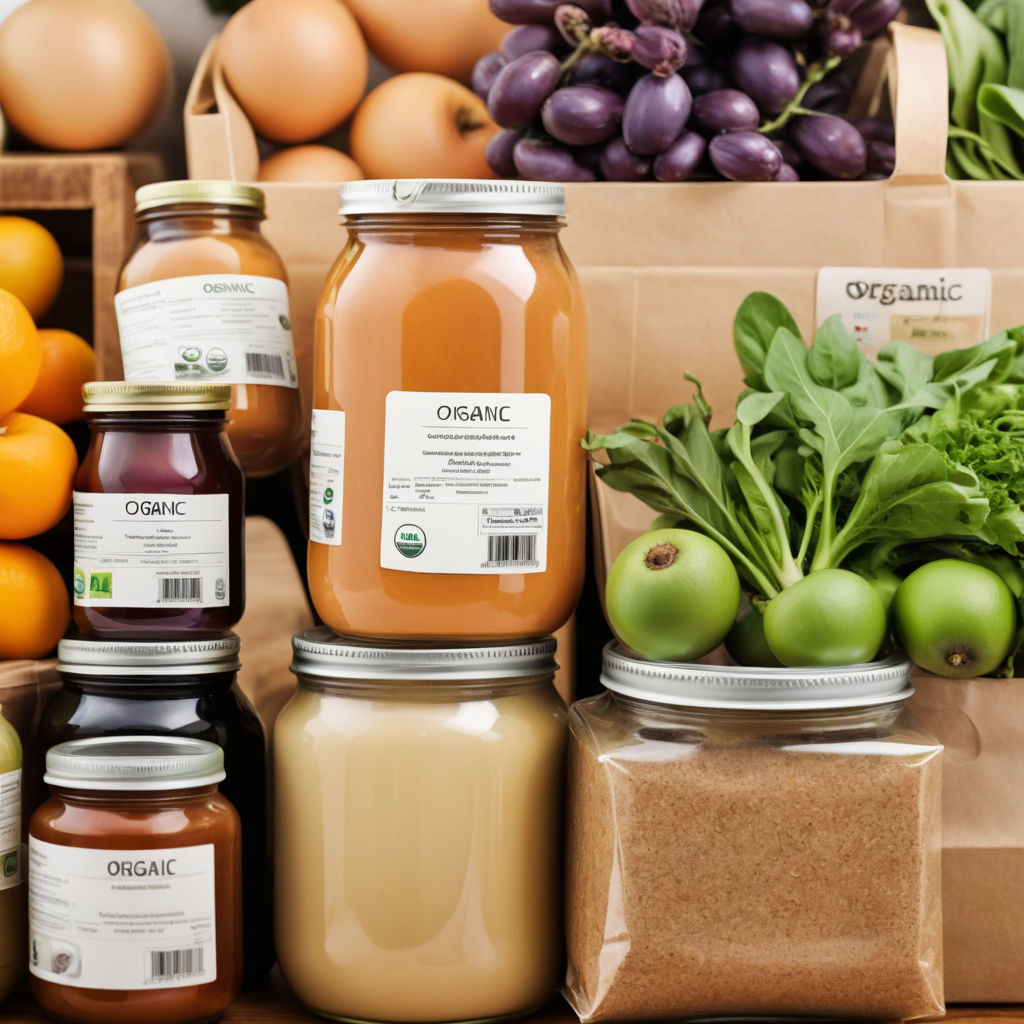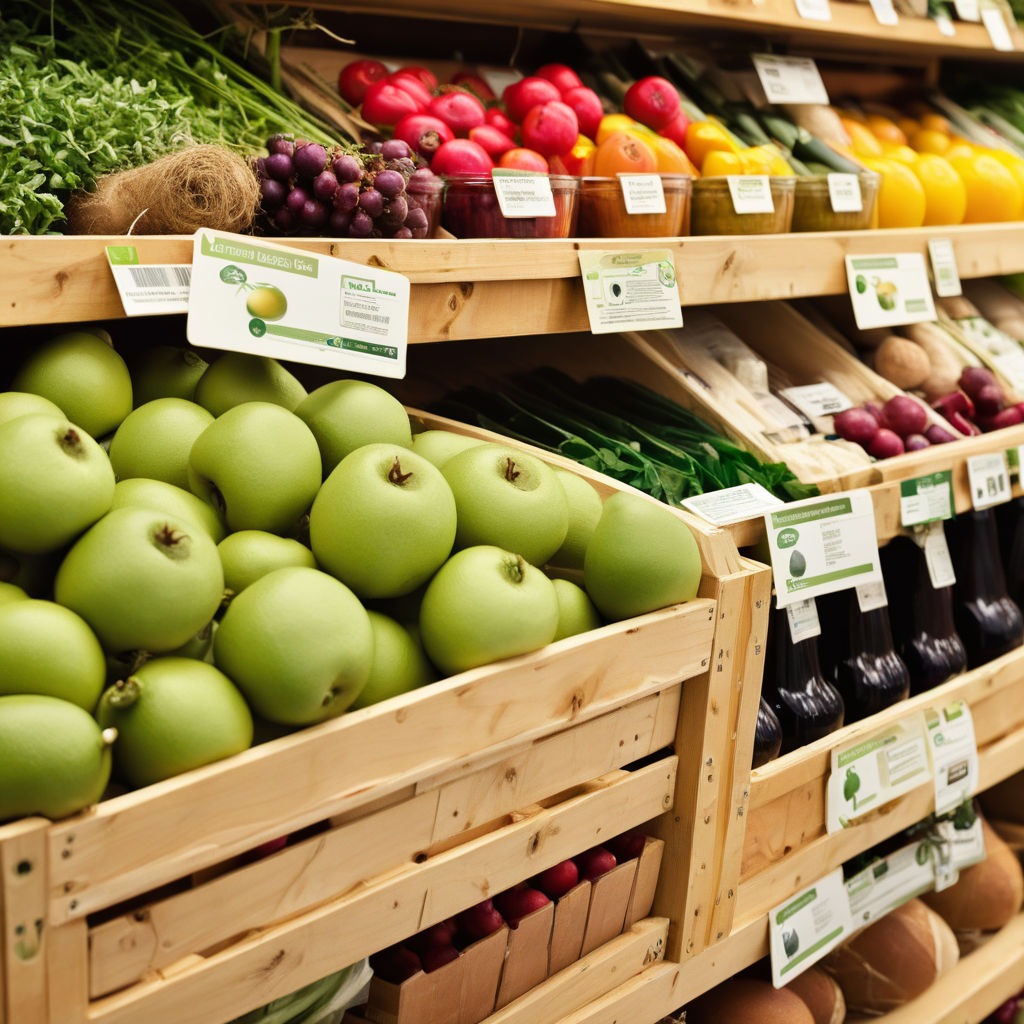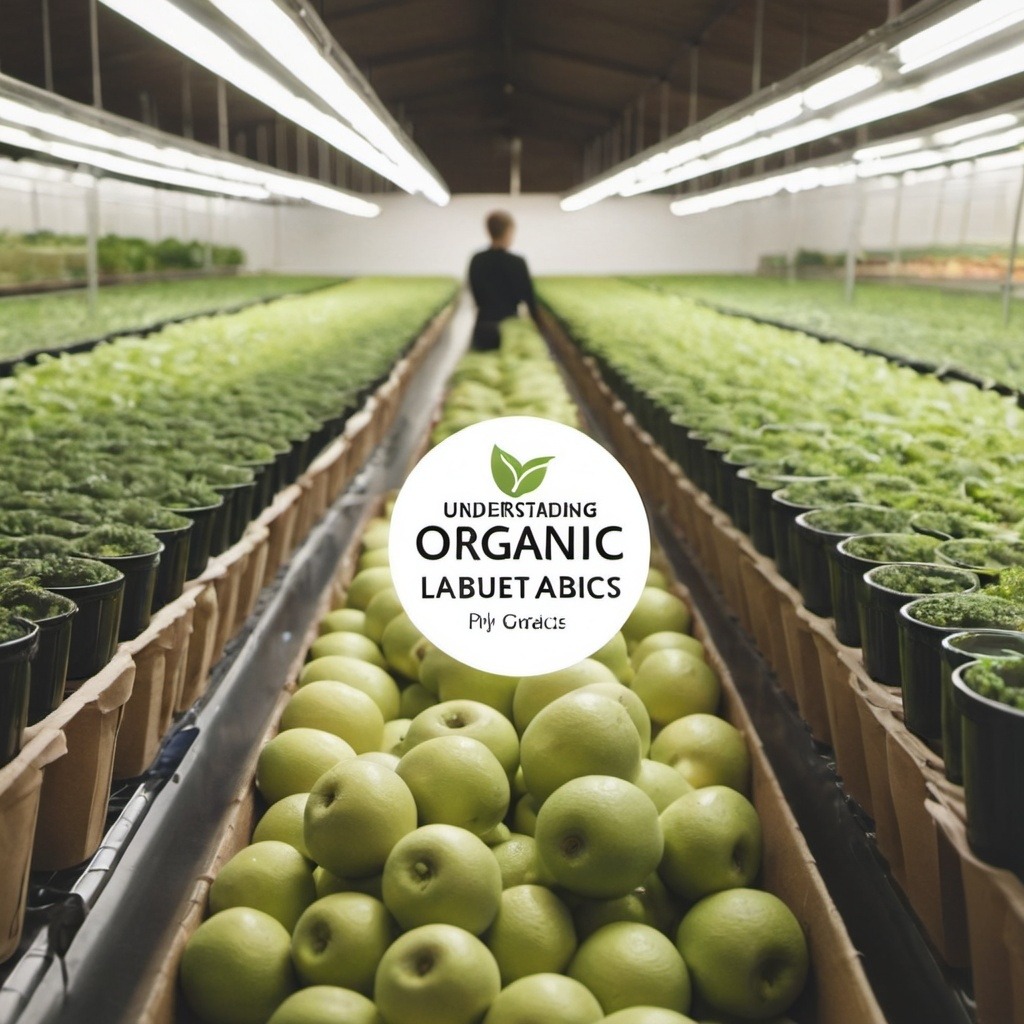
Understanding Organic Labels
Navigating the world of organic produce can be confusing, especially with the various labels and certifications that exist. Understanding what these labels mean is crucial to making informed choices and ensuring that you’re truly getting the benefits of organic products.
What “Organic” Really Means
When a product is labeled as organic, it signifies that it has been produced following specific guidelines that promote ecological balance and conserve biodiversity. Organic farming practices aim to reduce pollution, enhance soil fertility, and promote the humane treatment of animals.
This means no synthetic pesticides, herbicides, or fertilizers are used, and genetically modified organisms (GMOs) are strictly avoided.
USDA Organic Certification
In the United States, the USDA organic certification is the gold standard for organic products. To earn this certification, farms and producers must adhere to strict regulations set by the USDA National Organic Program (NOP). These regulations cover all aspects of production, from soil and water quality to pest control and animal raising practices.
Products that meet these standards are labeled with the USDA organic seal, providing consumers with a trusted indication that the product is genuinely organic. This certification process includes rigorous inspections and compliance with ongoing standards to ensure the integrity of the organic label.
Differences Between Organic, Non-GMO, and Natural
Understanding the distinctions between organic, non-GMO, and natural products is essential for making informed choices.
- Organic: As mentioned, organic products must meet stringent USDA guidelines that prohibit synthetic chemicals and GMOs, and they must be produced using sustainable practices.
- Non-GMO: Products labeled as non-GMO are verified to be free from genetically modified organisms. While this label ensures the absence of GMOs, it does not necessarily mean that the product is organic or free from synthetic pesticides and fertilizers. For more details on non-GMO products, you can visit the Non-GMO Project.
- Natural: The term “natural” is often used in marketing to imply that a product is wholesome or minimally processed. However, it is important to note that this label is not regulated by the USDA and does not guarantee the absence of synthetic chemicals, GMOs, or adherence to organic farming practices. Essentially, “natural” products may not offer the same health or environmental benefits as organic ones.
Understanding Organic Labels
Navigating the world of organic produce can be confusing, especially with the various labels and certifications that exist. Understanding what these labels mean is crucial to making informed choices and ensuring that you’re truly getting the benefits of organic products.
What “Organic” Really Means
When a product is labeled as organic, it signifies that it has been produced following specific guidelines that promote ecological balance and conserve biodiversity. Organic farming practices aim to reduce pollution, enhance soil fertility, and promote the humane treatment of animals.
This means no synthetic pesticides, herbicides, or fertilizers are used, and genetically modified organisms (GMOs) are strictly avoided.
USDA Organic Certification
In the United States, the USDA organic certification is the gold standard for organic products. To earn this certification, farms and producers must adhere to strict regulations set by the USDA National Organic Program (NOP). These regulations cover all aspects of production, from soil and water quality to pest control and animal raising practices.
Products that meet these standards are labeled with the USDA organic seal, providing consumers with a trusted indication that the product is genuinely organic. This certification process includes rigorous inspections and compliance with ongoing standards to ensure the integrity of the organic label.
Differences Between Organic, Non-GMO, and Natural
Understanding the distinctions between organic, non-GMO, and natural products is essential for making informed choices.
- Organic: As mentioned, organic products must meet stringent USDA guidelines that prohibit synthetic chemicals and GMOs, and they must be produced using sustainable practices.
- Non-GMO: Products labeled as non-GMO are verified to be free from genetically modified organisms. While this label ensures the absence of GMOs, it does not necessarily mean that the product is organic or free from synthetic pesticides and fertilizers. For more details on non-GMO products, you can visit the Non-GMO Project.
- Natural: The term “natural” is often used in marketing to imply that a product is wholesome or minimally processed. However, it is important to note that this label is not regulated by the USDA and does not guarantee the absence of synthetic chemicals, GMOs, or adherence to organic farming practices. Essentially, “natural” products may not offer the same health or environmental benefits as organic ones.
Health Benefits of Organic Produce
The health benefits of organic produce are substantial, making it a wise choice for those looking to improve their diet and overall well-being. From higher nutritional content to reduced exposure to harmful chemicals, organic fruits and vegetables offer a range of advantages that contribute to long-term health.
Nutritional Advantages
Organic produce is often found to contain higher levels of certain nutrients compared to conventionally grown counterparts. Studies have shown that organic fruits and vegetables can have higher concentrations of vitamins, minerals, and antioxidants. These nutrients are crucial for maintaining good health, supporting the immune system, and preventing various diseases. For instance, organic tomatoes and berries have been reported to contain significantly higher levels of vitamin C and antioxidants, which are essential for combating oxidative stress and inflammation in the body.
Reduced Exposure to Pesticides and Chemicals
One of the most compelling reasons to choose organic produce is the reduced exposure to pesticides and harmful chemicals. Conventional farming methods often rely heavily on synthetic pesticides and herbicides to protect crops from pests and diseases. However, these chemicals can leave residues on the produce, which consumers may ingest. Over time, this exposure can have adverse effects on health, particularly in children and pregnant women. Organic farming practices, on the other hand, use natural pest control methods and organic fertilizers, minimizing the presence of these harmful substances. By opting for organic produce, consumers can significantly lower their intake of pesticide residues and other toxic chemicals.
Long-term Health Impacts
The long-term health benefits of consuming organic produce are profound. Research suggests that a diet rich in organic foods can lower the risk of chronic diseases such as heart disease, diabetes, and certain cancers. The higher levels of antioxidants found in organic produce play a critical role in protecting cells from damage and reducing the risk of chronic inflammation, which is a common precursor to many serious health conditions.
Benefits for Children and Pregnant Women
Children and pregnant women are particularly vulnerable to the harmful effects of pesticides and chemicals found in conventionally grown produce. During pregnancy, exposure to these substances can affect fetal development and increase the risk of birth defects and other complications. For children, whose bodies and immune systems are still developing, the ingestion of pesticide residues can lead to various health issues, including developmental delays and behavioral problems.
Choosing organic produce ensures that children and pregnant women are consuming food that is free from harmful chemicals, providing a safer and healthier option. The nutritional advantages of organic foods also support the growth and development of children, contributing to their overall well-being.
In conclusion, the health benefits of organic produce are extensive, offering higher nutritional value and reduced exposure to harmful substances. By incorporating organic fruits and vegetables into your diet, you can enjoy better long-term health outcomes and provide safer, healthier food options for your family. For more information on the benefits of organic produce, you can visit the Environmental Working Group and Organic Trade Association.
Environmental Impact

Choosing organic produce isn’t just beneficial for personal health; it also has significant positive impacts on the environment. By supporting sustainable farming practices and local farmers, consumers contribute to a healthier planet and more resilient agricultural systems.
Sustainable Farming Practices
Organic farming prioritizes sustainable practices that work in harmony with nature. These methods focus on enhancing soil health, conserving water, and promoting biodiversity. By avoiding synthetic pesticides and fertilizers, organic farmers maintain the natural balance of the ecosystem, fostering a healthier environment for plants, animals, and humans.
Soil Health and Biodiversity
One of the cornerstones of organic farming is soil health. Organic farmers use techniques such as crop rotation, cover cropping, and composting to enrich the soil. These practices help to increase organic matter, improve soil structure, and boost its ability to retain water and nutrients. Healthy soil is less prone to erosion and more resilient to extreme weather conditions, making it crucial for sustainable agriculture.
Biodiversity is another key benefit of organic farming. By creating a more diverse and balanced ecosystem, organic farms can support a wide range of beneficial organisms, from pollinators like bees and butterflies to natural pest predators like birds and insects. This biodiversity helps to naturally control pest populations and reduces the need for chemical interventions.
Reduced Pollution and Greenhouse Gases
Organic farming practices significantly reduce pollution and greenhouse gas emissions. Conventional agriculture often relies on synthetic fertilizers and pesticides, which can contaminate waterways and soil, leading to environmental degradation. Organic farming avoids these harmful chemicals, reducing the risk of pollution and protecting water quality.
Furthermore, organic farming practices help to sequester carbon in the soil, thereby reducing greenhouse gas emissions. Techniques like cover cropping and reduced tillage promote the storage of carbon in the soil, which can help mitigate climate change. By choosing organic produce, consumers support farming practices that contribute to a cleaner, healthier environment.
Supporting Local Farmers
Buying organic produce from local farmers not only supports sustainable agriculture but also strengthens local economies. Small-scale organic farms often operate as part of a community-supported agriculture (CSA) program or sell their products at farmers’ markets. These direct-to-consumer sales channels provide farmers with fairer prices for their products, helping to sustain their livelihoods.
Economic Benefits for Local Communities
When consumers purchase organic produce from local farmers, the economic benefits extend beyond the farm. Money spent on locally produced food stays within the community, supporting other local businesses and services. This local economic activity helps to create jobs, boost local economies, and foster a sense of community resilience.
Promoting Sustainable Agriculture
Supporting organic farming is a powerful way to promote sustainable agriculture. By choosing organic produce, consumers send a clear message that there is demand for food produced in an environmentally responsible manner. This demand encourages more farmers to adopt organic practices, contributing to a larger shift towards sustainability in the agricultural industry.
In conclusion, the environmental impact of organic farming is profound, offering benefits for soil health, biodiversity, and climate change mitigation. By supporting local farmers and sustainable farming practices, consumers can play a crucial role in promoting a healthier planet. For more information on sustainable farming and the environmental benefits of organic agriculture, visit the Organic Farming Research Foundation and the Rodale Institute.
Cost Considerations
While the benefits of organic produce are numerous, one common concern among consumers is the higher cost compared to conventionally grown produce. Understanding the reasons behind these higher prices and learning how to save money on organic produce can help make organic choices more accessible.
Why Organic Produce Can Be More Expensive
Organic produce often comes with a higher price tag, and several factors contribute to this cost difference. Organic farming practices tend to be more labor-intensive and require more time and effort to manage compared to conventional methods. Organic farmers use natural pest control methods, crop rotation, and manual weeding, which can be more costly and time-consuming than relying on synthetic chemicals.
Additionally, organic farmers often face higher costs for organic seeds, soil amendments, and certification. The USDA organic certification process is rigorous and requires regular inspections and compliance with strict standards, which can add to the overall cost of production.
Smaller-scale organic farms may not benefit from the same economies of scale as large conventional farms, leading to higher prices for their produce.
Factors Influencing Price

Several key factors influence the price of organic produce:
- Labor Costs: Organic farming practices are more labor-intensive, requiring more hands-on work, such as manual weeding and pest control.
- Certification Costs: Obtaining and maintaining USDA organic certification involves fees and regular inspections, adding to the overall production costs.
- Input Costs: Organic farmers use natural inputs like compost and organic fertilizers, which can be more expensive than synthetic alternatives.
- Scale of Production: Many organic farms operate on a smaller scale, which can lead to higher costs per unit of produce due to the lack of economies of scale.
Tips for Saving Money on Organic Produce
Despite the higher costs, there are several strategies consumers can use to make organic produce more affordable.
Seasonal Buying
Purchasing organic produce that is in season is one of the best ways to save money. Seasonal fruits and vegetables are often more abundant, leading to lower prices. Additionally, in-season produce is fresher and often tastes better. Planning meals around seasonal availability can help reduce grocery bills while enjoying the full flavor and nutritional benefits of fresh produce.
Farmers’ Markets and Co-ops
Shopping at farmers’ markets and participating in community-supported agriculture (CSA) programs can also help reduce costs. Farmers’ markets often offer competitive prices for organic produce because there are no middlemen, and consumers can buy directly from the growers. CSA programs allow consumers to purchase shares in a local farm’s harvest, providing a steady supply of fresh, seasonal produce at a lower overall cost.
Farmers’ markets and co-ops not only offer fresh, locally grown produce but also support local farmers and contribute to the local economy. By cutting out the middleman, these direct-to-consumer sales channels often provide organic produce at more affordable prices than conventional grocery stores.
Where to Buy Organic Produce
Finding reliable sources for organic produce is essential for maintaining a healthy diet and supporting sustainable agriculture. There are several avenues to explore, from local options to grocery stores and online services, each offering unique benefits and a variety of certified organic items.
Local Options
Farmers’ Markets
Farmers’ markets are an excellent place to buy fresh, organic produce directly from local farmers. These markets provide an opportunity to ask farmers about their growing practices and ensure that the items are genuinely organic. The direct interaction with growers allows consumers to learn more about the food they are purchasing and supports the local economy.
Community-Supported Agriculture (CSA) Programs
Community-supported agriculture (CSA) programs offer another fantastic way to access organic produce. By joining a CSA, you purchase a share in a local farm’s harvest and receive a box of fresh, seasonal produce on a regular basis. This model not only provides a steady supply of organic food but also helps farmers by giving them financial support at the beginning of the growing season. CSAs often include a variety of ingredients, from vegetables and fruits to organic chicken and other farm products.
Grocery Stores and Supermarkets
How to Spot Genuine Organic Products
When shopping at grocery stores and supermarkets, it’s important to know how to identify certified organic products. Look for the USDA organic seal on packaging, which indicates that the item meets strict organic standards. Additionally, be cautious of labels like “natural” or “non-GMO,” as they do not guarantee the product is organic. Reading ingredient lists and product descriptions can also help ensure you’re buying authentic organic food.
Popular Organic Brands
Many grocery stores carry a range of popular organic brands. Some well-known brands to look for include:
- Earthbound Farm: Known for its organic vegetables and salads.
- Horizon Organic: Offers a variety of organic dairy products.
- Amy’s Kitchen: Provides organic prepared meals and soups.
- Nature’s Path: Specializes in organic cereals and snacks.
- Applegate Farms: Offers organic meat and chicken products.
These brands are widely available and recognized for their commitment to organic farming practices.
Online Services
The convenience of online shopping has made it easier than ever to buy organic produce. Several online services specialize in delivering organic food directly to your door. These services often offer a wide selection of certified organic items, from fresh produce to pantry staples and prepared meals.
Popular Online Organic Food Services
- Thrive Market: An online marketplace that offers a variety of organic and non-GMO products at discounted prices. They have a membership model that provides access to exclusive deals on organic items.
- Amazon Fresh: Provides a selection of organic produce and other grocery items, with the convenience of fast delivery.
- Farmbox Direct: Delivers fresh, organic produce boxes straight to your home, allowing you to choose from a variety of box sizes and types.
- Imperfect Foods: Offers organic produce and other grocery items that might not meet the aesthetic standards of conventional grocery stores, helping to reduce food waste.
